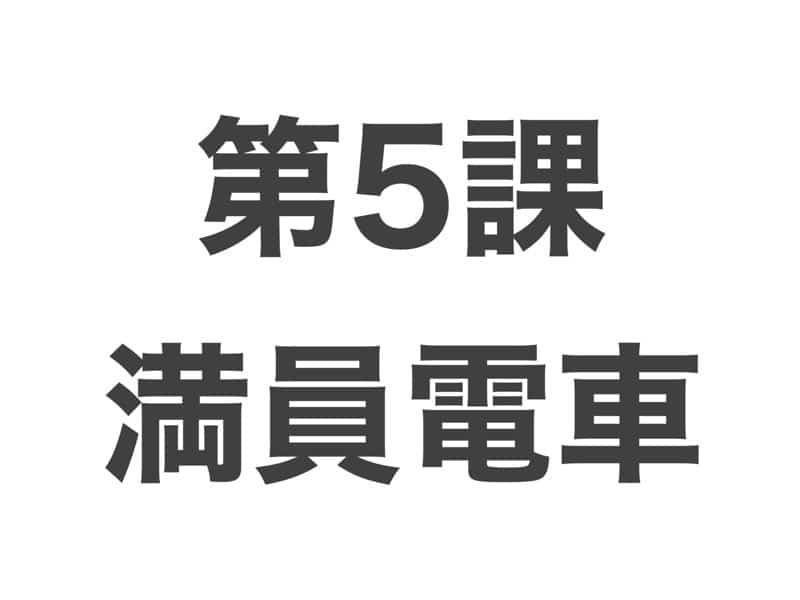新しい言葉
| 難しさ | Difficulty |
| 中でも | Especially, Among them |
| 社会 | Society |
| 様子 | Appearance, Situation, State |
| 場所 | Place |
| たばかり | Just (recently) |
| ころ | Time, Around (referring to a specific point in time) |
| 満員 | Crowded, Full (e.g., a crowded train) |
| がまんする | To endure, To put up with |
| ふしぎな | Strange, Mysterious |
| てたまらない | Can’t stand, Can’t help, really |
| 眠る | To sleep |
| 会社員 | Office worker, Company employee |
| この前 | The other day, Recently |
| 席を取る | To take a seat |
| 取り出す | To take out |
| 大声 | Loud voice |
| 途中 | On the way, In the middle of |
| お年寄り | Elderly person, Senior |
| 夢中 | Absorbed, Engrossed |
| 礼儀正しい | Polite, Well-mannered |
| なんて | (Expression of surprise) Such as, Things like |
| あきれる | To be astonished, To be amazed (in a negative sense, shocked or appalled) |
| 手を貸す | To lend a hand, To help |
| じっとする | To stay still, To remain motionless |
| 列 | Line, Queue |
| 信じる | To believe, To trust |
いっしょに考えましょう
- Have you ever been surprised by something when you went abroad? What was it?
- Since coming to Japan, are there things you think are better than what you did before, and things you think are not as good?
- Have you ever faced difficulties when something was different from the way you do things, and it was hard to get used to?
読みましょう
Before coming to Japan, I had the opportunity to hear about Japan and the difficulties of the Japanese language from a person who had studied in Japan. After coming to Japan, there were times when I thought, “That story was true,” and other times when I thought, “It’s a little different.” There is much to learn everywhere, but especially until I got used to living here, the train I used every day was the best place to observe society. When I had just arrived in Japan, I couldn’t help but wonder how people could endure the crowded morning trains, and I was also surprised to see people, who appeared to be company employees, sleeping after drinking alcohol at night.
The other day, something like this happened. Three or four elementary school students got on the train, hurried to take seats, pulled out their games, and started making a lot of noise. The adults around them were either reading books or looking at their phone screens, and no one bothered to tell the kids to be quiet. Even when an elderly person with a large bag boarded the train later, the children were too absorbed in their games to offer their seat. I was shocked and thought, “Is the idea that ‘Japanese people are kind and polite’ really true?”
I’ve had many experiences where people lent me a hand when I was in trouble, and I’ve often seen people patiently standing in line at stations or restaurants. However, like what I saw on the train the other day, there have also been moments when I couldn’t believe that such kind and polite Japanese people would act in certain ways. What’s important now, I think, is to pay attention to what I see and hear, and think about why things are the way they are and why they might be different from how I was raised or the customs I’m used to.
答えましょう
- What kind of person is the author?
- How does the author describe the train the author use every day?
- What did the author think when the author was on this train right after coming to Japan?
- What kind of elementary school students did the author see recently?
- How did the adults around them react?
- What did the author think when they saw the elementary school students not offering their seats to elderly passengers?
- What kind of kind and polite people has the author seen so far?
- Have all the Japanese people the author has encountered been kind and polite?
- What does the author say is the important thing to do now?
使いましょう
まとめましょう
- Where did the author learn about society after coming to Japan?
- What did the author think after seeing elementary school students and the adults around them on the train?
- What did the author plan to do with the things they have seen and heard in Japan so far?
話しましょう
- Have there been things that surprised or shocked you? Why was that?
- When you saw or heard about things from other countries, have you thought they were different from your own culture? Why do you think they are different?






コメント